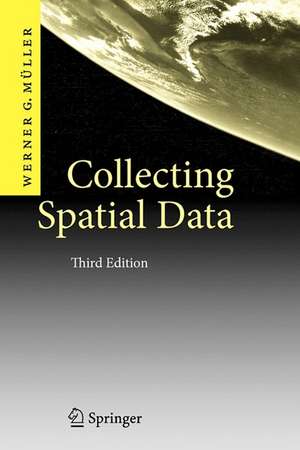Collecting Spatial Data: Optimum Design of Experiments for Random Fields
Autor Werner G. Mülleren Limba Engleză Paperback – 14 oct 2010
| Toate formatele și edițiile | Preț | Express |
|---|---|---|
| Paperback (1) | 638.43 lei 6-8 săpt. | |
| Springer Berlin, Heidelberg – 14 oct 2010 | 638.43 lei 6-8 săpt. | |
| Hardback (1) | 642.51 lei 6-8 săpt. | |
| Springer Berlin, Heidelberg – 29 aug 2007 | 642.51 lei 6-8 săpt. |
Preț: 638.43 lei
Preț vechi: 751.10 lei
-15% Nou
Puncte Express: 958
Preț estimativ în valută:
122.17€ • 130.64$ • 101.86£
122.17€ • 130.64$ • 101.86£
Carte tipărită la comandă
Livrare economică 18 aprilie-02 mai
Preluare comenzi: 021 569.72.76
Specificații
ISBN-13: 9783642068294
ISBN-10: 3642068294
Pagini: 256
Ilustrații: XII, 242 p. 37 illus.
Dimensiuni: 155 x 235 x 13 mm
Greutate: 0.36 kg
Ediția:Softcover reprint of hardcover 3rd ed. 2007
Editura: Springer Berlin, Heidelberg
Colecția Springer
Locul publicării:Berlin, Heidelberg, Germany
ISBN-10: 3642068294
Pagini: 256
Ilustrații: XII, 242 p. 37 illus.
Dimensiuni: 155 x 235 x 13 mm
Greutate: 0.36 kg
Ediția:Softcover reprint of hardcover 3rd ed. 2007
Editura: Springer Berlin, Heidelberg
Colecția Springer
Locul publicării:Berlin, Heidelberg, Germany
Public țintă
Professional/practitionerCuprins
Fundamentals of Spatial Statistics.- Fundamentals of Experimental Design.- Exploratory Designs.- Designs for Spatial Trend Estimation.- Design and Dependence.- Multipurpose Designs.
Recenzii
From the reviews of the third edition:
"Collecting Spatial Data signifies … the state of the art of the design of spatial networks. … the monograph is well focused on the important problem of spatial sampling. … The book will continue to be a stalwart reference for practitioners in the field of spatial estimation and a thorough introduction for graduate students in the field. This third edition nicely fulfills the aim … of providing an overview of classical and recent methods for the efficient collection of spatial data." (Michael Manton, Eos, Vol. 89 (15), 2008)
"Collecting Spatial Data signifies … the state of the art of the design of spatial networks. … the monograph is well focused on the important problem of spatial sampling. … The book will continue to be a stalwart reference for practitioners in the field of spatial estimation and a thorough introduction for graduate students in the field. This third edition nicely fulfills the aim … of providing an overview of classical and recent methods for the efficient collection of spatial data." (Michael Manton, Eos, Vol. 89 (15), 2008)
Textul de pe ultima copertă
The book is concerned with the statistical theory for locating spatial sensors. It bridges the gap between spatial statistics and optimum design theory. After introductions to those two fields the topics of exploratory designs and designs for spatial trend and variogram estimation are treated. Special attention is devoted to describing new methodologies to cope with the problem of correlated observations. A great number of relevant references are collected and put into a common perspective. The theoretical investigations are accompanied by a practical example, the redesign of an Upper-Austrian air pollution monitoring network. A reader should be able to find respective theory and recommendations on how to efficiently plan a specific purpose spatial monitoring network. The third edition takes into account the rapid development in the area of spatial statistics by including new relevant research and references. The revised edition contains additional material on design for detecting spatial dependence and for estimating parametrized covariance functions.
Caracteristici
Book bridges the gap between spatial statistics and optimum design theory New edition includes new relevant research and references Includes supplementary material: sn.pub/extras
















